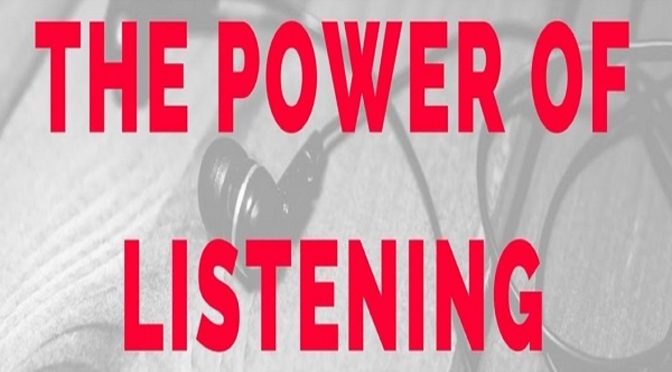Contents
Introduction
If there is one skill that we all can get better at, to become better leaders, entrepreneurs, friends, and human beings, it is listening. Have you noticed how the word listen contains the same letters as the word silent? In order to listen, a person must be silent. In today’s high-tech, high-speed, high-stress world, communication is more important than ever, yet we seem to devote less and less time to really listening to one another. Genuine listening has become a rare gift ‑the gift of time. It helps build relationships, solve problems, ensure understanding, resolve conflicts, and improve accuracy. At work, effective listening means fewer errors and less wasted time. At home, it helps develop resourceful, self-reliant kids who can solve their own problems. Listening builds friendships and careers. It saves money and marriages. The greatest commandment is love, love of God and love of neighbour. However, both depend on the capacity to listen. Hence, the power of listening. It is listening that leads to love. Whoever does not listen, cannot comprehend this.
The first commandment
“One of the scribes came near and heard them disputing with one another, and seeing that he answered them well, he asked him, which commandment is the first of all?” (Mark 12:28). To understand the sense of this question, we have to look back to Mark 12:1–27. After the parable of the vineyard in which the Jewish authorities recognized that they are the wicked tenants who killed the servants and heir of the owner of the vineyard (cf. Mark 12:1–12), they stayed back and sent the Pharisees and the Herodians to question Jesus on whether to pay tax to Caesar or to ignore the order. Again, Jesus silenced them with the classical instruction to return to Caesar what belongs to Caesar, and to God what rightly belongs to God (cf. Mark 12:13–17). When these attempts failed, the Sadducees came up with the question about resurrection, citing the example of a woman who got married to seven brothers. As usual, Jesus defeated them by explaining to them that the kingdom of God is not about marriage and marriage banquet, reminding them that God is not God of the dead but of the living. Jesus concluded his reply by telling the Sadducees that they were very much mistaken by thinking that their earthly marriage continues in the kingdom of God (cf. Mark 12:18–27).
Conclusion
You should speak in such a way that others love to listen to you, and listen in such a way that others love to speak to you. We must listen because as Dalai Lama rightly pointed out, “when you talk, you are only repeating what you already know. But if you listen, you may learn something new.” Listening is a magnetic and strange thing, a creative force. The friends who listen to us are the ones we move toward. When we are listened to, it creates us, makes us unfold and expand. B. C. Leal observes that listening and speaking are the basic communication tools we use every day. We use them to process language as we interact with others. When we use these tools well, they help us create wonderful, growing, lasting relationships. However, when used improperly, those very tools of listening and speaking can create a lot of hurt, damage, and even destruction to relationships. We should learn to speak and listen properly.
FOR DETAILS, GET YOUR OWN COPIES OF THE BOOK “THE WORD OF LIFE: SUNDAY REFLECTIONS” (vols. I and II)!! The reflection for the 31st Sunday of the year (B) is found in vol. II pages 489–501. Happy reading!
For details on how to get it, contact the author on this link: https://m.me/uchennabiblia?fbclid=IwAR2yeg4a6sDGBp9QGkIvKj6FSADumMokN6lshdE0zuo-JHs6qOmlhA7jyHo or email me at: postmaster@uchennabiblia.com or simply send an SMS on 08116100926, and I will get back to you.

